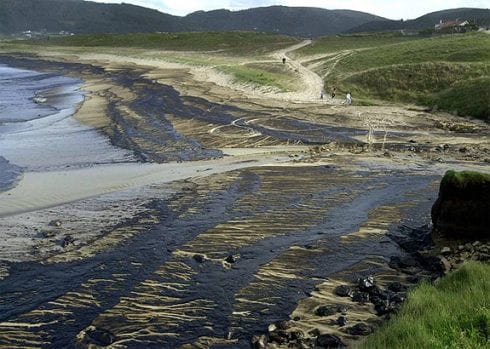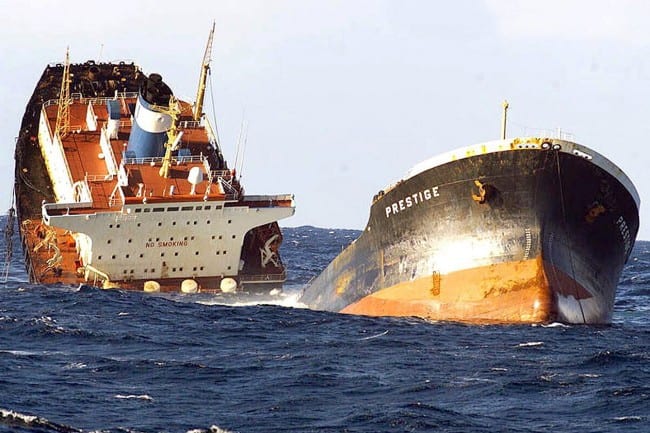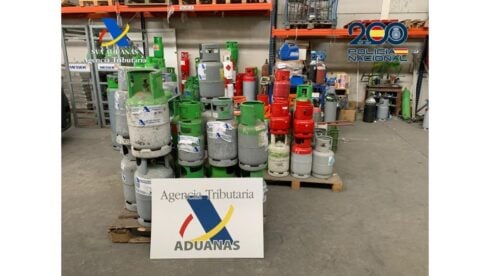On November 19, 2002, a ship went down off the Spanish coast, causing an ecological catastrophe. MICHAEL COY reminds us what happened.
SPAIN is especially vulnerable to pollution caused by sinking ships.
The country has more than 3,000 miles of coastline, and the choke point of the Strait of Gibraltar is both insanely busy and absurdly narrow. All maritime traffic moving east–west has to funnel through it.
It’s like the M1 being reduced to a single lane – for all vehicles, in both directions.
Though we now have some electric cars and some wind power, society is still super-dependent on petroleum.
Global demand for oil keeps rising. Millions of cars, planes and ships burn it every day. And something we don’t think about nearly enough is that all our plastic comes from oil.
Look around you now – pens, bottles, phones, even the seats, and the clothes on our backs with their part-synthetic fibres – all of it is plastic.
And oil isn’t easy to move from one country to another, at least not in the vast quantities we use.
Pipelines exist, but they’re hardly viable: they’re easy terrorist targets, and they cross borders where one dictator can hold his neighbours to ransom. So we move oil by ship.
It’s far from ideal, but there’s no convenient alternative. The first problem is that no-one owns the high seas. Any safety regulations we devise cease to apply once a vessel leaves coastal waters.
No-one polices the open ocean.
Second, oil and water don’t mix. Pour oil into the sea and it doesn’t dissolve – it floats wherever wind and currents take it.
And third, accidents happen.
The Prestige was a tanker. By the autumn of 2002 it was 27 years old and suffering serious structural defects.
Officially, it had a Greek crew (who turned out to be from the Philippines) and was registered in the Bahamas. It was owned by a shadowy corporation licensed in Liberia.
On board were 77,000 tonnes of crude oil. An accident, you might think, waiting to happen.
And it happened.
About 160 miles off Spain’s north-west coast, a storm blew up and one of its oil containers ruptured. The skipper begged for emergency permission to enter port – any port. Portugal, France and Spain all refused.
For a week the stricken tanker drifted aimlessly, spilling oil into the Atlantic. Finally, on November 19, it split in two and sank.
Around 80% of its cargo – 17 million gallons of crude – was now loose in the sea. (The wreck, believe it or not, is still leaking oil today.)
It was Spain’s worst-ever environmental disaster. Winds drove the slick straight onto the Galician shore.

Galicia, in the country’s far north-west, depends on two things – tourism and seafood. Both were obliterated by the biblical tide of thick, black, foul-smelling oil.
Birds and fish died in their millions. Seafood sales were banned. Galicia’s pristine beaches, once Europe’s cleanest, were overwhelmed by sticky black sludge.
No-one knows the exact cost of the clean-up, but one estimate runs to €100 million.

Of course, there was an inquiry. Of course, it lasted for years. And of course, given the Prestige’s murky ownership structure, no-one was held liable.
Spain sued the corporation that ‘owned’ the vessel, but the insurers refused to pay. The case was dismissed in 2007. Still, the hearings produced some telling facts.
It appears the ship had sailed from Russia. Its original captain was fired after pointing out the vessel’s structural weakness.
No inspection was carried out before departure. Had one been made, a curious detail might have emerged: the Prestige’s two sister ships, the Alexandros and the Centaur, had recently been scrapped because metal fatigue in their hulls made them unseaworthy.
The World Wildlife Fund called for every trading nation to switch to double-hulled tankers.
Better still, perhaps, we could simply use less oil?
Click here to read more Green News from The Olive Press.








